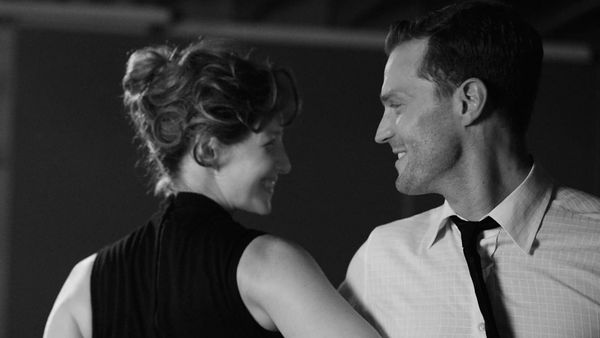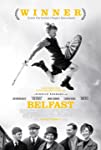Eye For Film >> Movies >> Belfast (2021) Film Review
Belfast
Reviewed by: Amber Wilkinson

Kenneth Branagh has taken on some of the world's most famous tales - from Shakespeare's Henry V to Agatha Christie's Murder On The Orient Express to fairy tale classic Cinderella - but this time out, it's personal, as he steps back into his own past for the semi-autobiographical Belfast. As the old joke goes, everything was in black and white back then, and so it is, for the most part in Branagh's film, which travels from a brief colour tour of Belfast today back over a wall and back to a monochrome summer of 69 in Belfast. To be specific, the date is August 15, one day after the Battle of the Bogside riot ended, which many historians consider to be the first major event of what came to be known as "the Troubles".
Although beginning with an outbreak of violence on a working-class residential street - at that point populated by both Catholic and Protestant families, which was soon set to change - this is a film that is as much about the intimacy of community and family as conflict, with events seen from the point of view of young Buddy (Jude Hill, a real discovery in his first role).

Much of the initial intimacy we see is a product of proximity. These are terraced streets of small houses, packed with large families, whose children fill the street with their games even as barricades begin to spring up. Nine-year-old Buddy is the perfect companion for an audience, more interested in getting a Catholic girl in his class to notice him than the trouble flaring up on the street, but impacted by the rising tensions anyway. Branagh has an easy way with a camera and isn't afraid of sentiment, but he offsets this with a good line in comedy that cuts through the softer stuff like an astringent.
There's mischief afoot as Buddy's older cousin ropes him in on a raid on the local corner shop - her dismay at what he takes will give a chuckle to many who were kids in the era - but there's also a nod to darker times ahead. His cousin, like Buddy, a Protestant, loftily informs him that you can tell who the Catholic kids are by their names but then adds, "You have to get taught it". "Who teaches you?" Buddy wonders, the question hanging in the air, reminding us that prejudice is something we learn not that we're born with.
The ability to smuggle in stronger themes while not losing sight of the mainstream entertainment he's crafting has always been part of Branagh's armoury. But the serious stuff never gets in the way of more everyday observations, like pops taking time out in the outhouse or mum on the phone in the hall. Here we spend a few months with Buddy and his extended family, as his pa (Jamie Dornan) tries to persuade his ma (Caitriona Balfe) that it's time to leave the tensions of Belfast behind them and head for England, while his granny (Judi Dench) and pops (Ciaran Hinds) share sweetly worked scenes as they grapple with the ageing process and the prospect of their family moving away. The tension between ma and pa runs through the film, encapsulating domestic emotions that fed off and reflected the increasing pressures in the wider community.
One could quibble that a night of big band music and romance feels almost as though it's popped in from a neighbouring musical, but the child's perspective helps to ease us over these sort of humps, as Buddy experiences things in the heightened way of the young - also indicated by the way that TV programmes, films and even the theatre are shot in full colour as though dragging the youngster into his own private Oz. Although this community would go on to be largely defined by strife in the eyes of the world for many years to follow, Branagh makes sure that what we chiefly feel is the love.
Reviewed on: 14 Jan 2022
















